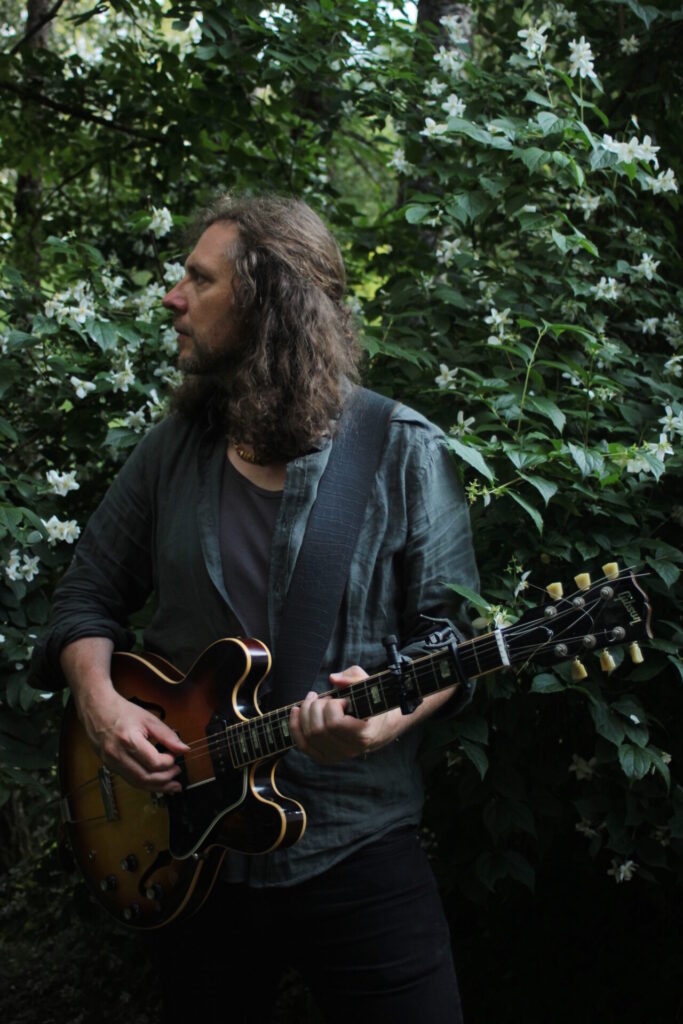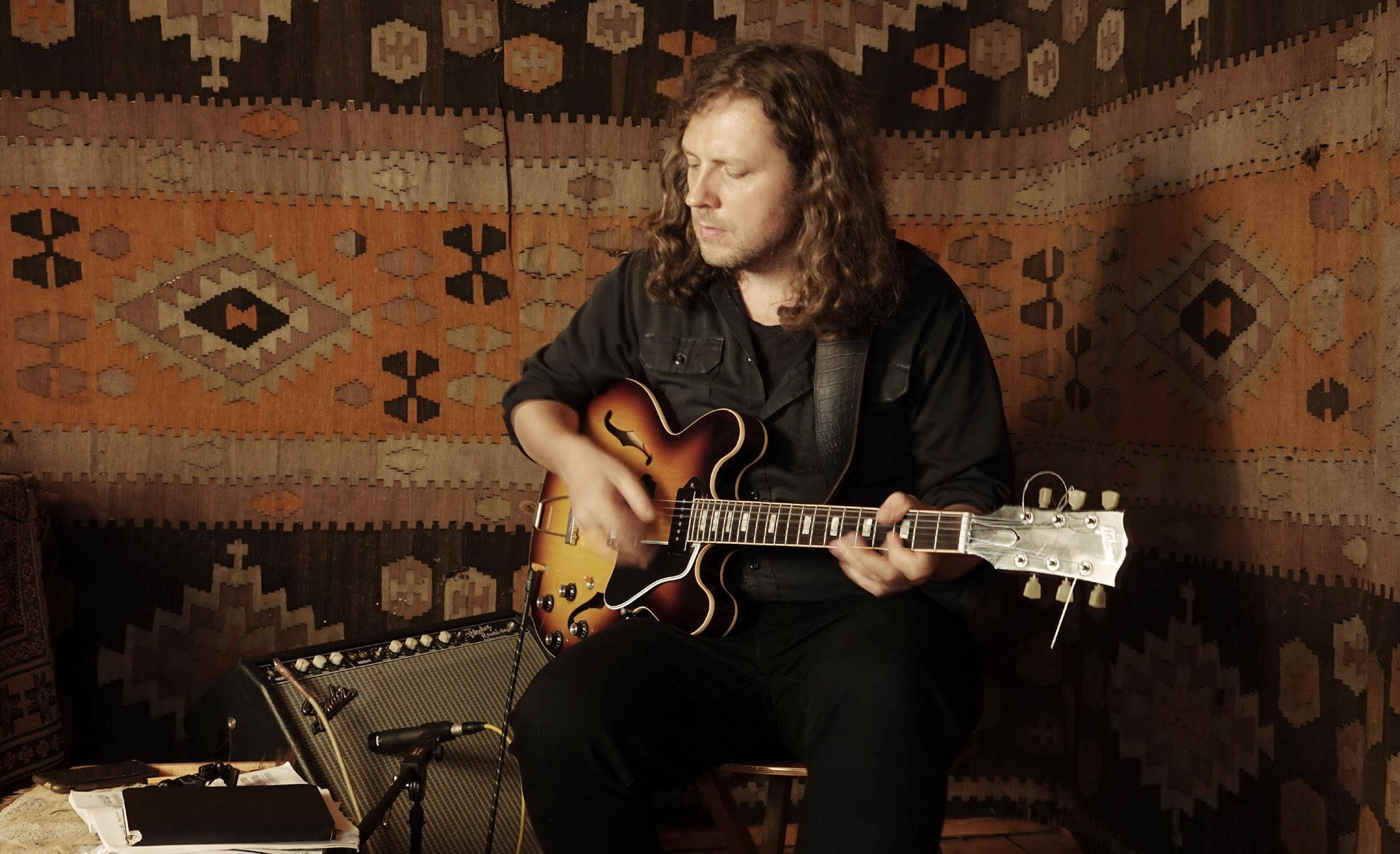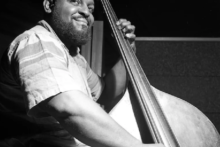“I love the world,” says Raphael Roginski. “We’re used to complaining about it, but it’s amazing. David Attenborough was once asked what planet he would choose if he had the opportunity to choose any. And he said, ‘I wouldn’t want to go anywhere else, because I find the world so beautiful and beyond my grasp.’”
For Rogiński, exploring the world is an act both of contemplation and of endless work. He digs into almost every genre. He has played Bach and embraced Jewish music with his projects Shofar and Cukunft, created what he called ‘surf-religious’ music with Alte Zachen, and blues with the group Wovoka. In the duo Żywizna, he explored folk from the Kurpie region of Central Poland.
He started playing at the age of fifteen – maniacally for days on end, to the point where blood would flow from his fingers. His father had survived the Holocaust and was fired from his job in Łódź in 1968 following a surge in antisemitism in Poland, after which Rogiński’s family emigrated to Frankfurt am Main, which was still rebuilding after the Second World War. At the beginning of the 1980s, he and his mother returned to Poland and settled in Podkowa Leśna, a garden city on the outskirts of Warsaw, where he was immersed in the atmosphere of a bohemian artistic community that was also still scarred by the war. He seeped into the Warsaw music scene at the turn of the millennium, driven by a rare hunger for culture from across the world that still exists today. Last year’s Talan, for instance, was influenced by visits to Odesa and is inspired by the Black Sea, which he sees as the heart of Central and Eastern Europe.
The region’s people, he says, “live in a depressive, post-colonial Russian-French romanticism, but I think we belong much more to Sufism [that predated it]. From the beginning of life, we learn that out of love, one should suffer. We are always clipping our wings. There are many impossible things to do because that’s how we’ve been directed. But love in Sufism is understood differently: it is liberation. It’s time to change our perspective.”
He released Žaltys this spring, a solo album referencing Lithuanian folklore. Lithuania and its borderlands are where he spent his childhood, and Rogiński says he often experiences spiritual moments in such places when he records. January, meanwhile, saw the release of yet another LP, this time with Hizbut Jámm, which featured collaboration with, among others, Senegalese singer, actor, and guitarist Mamadou ‘Góo’ Ba. “It’s Warsaw folk,” says Roginski, in rebuttal to the troublesome definition of ‘world music’. “When creating new songs, I am sometimes inspired by krautrock, but I am also fascinated by music from Senegal. I once heard from Mamado that I play as if I was from the north of Senegal, specifically from the regions bordering Mauritania”. For Rogiński, who brings together so many perspectives, ‘world’ does not define a style or a territorial boundary – only a way of thinking.
Although at times Rogiński’s work is easy to assign to a distinct musical style – sometimes blues, sometimes jazz, Jewish music or folk – he essentially remains genreless through his geographical, stylistic, and intellectual travels. In one way his guitar playing could be viewed as a uniquely eastern variation of American primitivism; in another, it evokes a kind of ‘saudade’ for Central and Eastern Europe. In yet another, it’s a blustery disagreement with reality. Cycling through aesthetics is not a matter of just playing with conventions, or postmodern eccentricity, he says. “It’s a processing of a certain world wisdom. I create music where sometimes you don’t quite know how it is made.
“For me, it’s the soundtrack of a modern man loving the world,” he continues. “We live in cities, listen to music on YouTube and various media, and traditional cultures disappear. What I create is an attempt to capture this new reality filtered through contemporary experiences.” He mentions the Slovenian band Širom, who have created a musical language using instruments from different cultures. “It’s about making it here and now, but of course, that has to be backed up by hard work, too. We should not only be interested in this world but also passionate about it,” he says.

One of Rogiński’s most beautiful albums is 2015’s Plays John Coltrane And Langston Hughes, recorded with singer Natalia Przybysz, which has been sold out and unavailable on streaming services for the past nine years. This week, however, Unsound Festival will reissue the record, where Rogiński’s dry-sounding, delicate guitar, serves as a vehicle for Coltrane’s spirituality.
“John Coltrane symbolises the origins of spirituality in music. Although his work came from a completely different tradition, I found something universal – a deep spiritual dimension that I want to weave into my music,” says Roginski, who was introduced to Coltrane in music school, then came across Alice Coltrane and then the likes of John Lee Hooker, Albert Ayler, Phil Cohran and James Blood Ulmer. “I wanted to touch on that spirituality in some way, and on the other hand the situation in which Black musicians lived at the time. At that time, spirituality was an essential part of music, out of necessity, and as a part of social change.” For the reissue he added four new songs – recorded this summer – which he hopes add what he had not shown when the release came out nine years ago: hope.
In the coming months he will play the Coltrane album at two editions of the Unsound festival – in October in Krakow and in November in New York (you can also catch him playing Żaltys with Indrė Jurgelevičiūtė and Hizbut Jamm at Le Guess Who? in Utrecht this November). For Unsound he will be joined by two artists who he sees as kindred spirits in Jim White and Amirtha Kidambi.
“I have wanted to do something with Jim White for a long time; I love his project with George Xylouris with music from Crete. His father, Psarantonis, also fascinated me; his family is very musical. I also had my period with the music of Crete, travelling around this amazing place,” Rogiński says. “He, I feel, is also looking for himself in today’s world, and he’s brilliant”. Kidambi, meanwhile, interests him thanks to her roots in blues and free jazz, her search for Carnatic music and her rebellious ideas.
Rosiński’s recent travels have taken him from shows at Rewire in The Hague to Bristol New Music in the spring, followed by a journey through the Czech Republic, Denmark and Spain. As we speak, he’s just returned from Serbia, and says that next he wants to create a series of albums dedicated to Central and Eastern European spirituality. “In Georgia, I recorded with musicians from Tbilisi, a naturally multicultural city, and next year, I plan to make Armenian recordings and do something further in the region. I also want to create a project related to the Tatar tradition,” he says.
“As people [from Central and Eastern Europe, in the past] we were standing with such an underdog complex,” he continues. In Rogiński’s opinion, the early 90s were a formative moment, an attempt to catch up. Bands like Księżyc – who mixed experimental and devotional sounds with acoustic instruments and Slavic folk – were building up a new consciousness and language, searching for a particular sound that reflected their region, but before long many started looking West, wanting to play like the bands in Berlin, London, or New York. As an émigré, a member of a minority, and an Eastern European, he wants to add to this story through musical meetings with artists from different parts of the continent.
Central and Eastern Europe is embroiled in a time of political and psychic flux, and Rogiński says he wants to see it, observe it, and be part of it all and of the changes yet to come. His travels also allow him to process that into music and become a witness of it, to know more about what is happening around us “For me [the definition of] Central and Eastern Europe is much wider: from Finland to Greece, Ukraine, Turkey and the Caucasus. I soak it in; I don’t accept that we know nothing about our neighbours,” he says. “To create something of value, we must work together.”
Unsound’s reissue of Raphael Rogiński Plays John Coltrane And Langston Hughes is released on 27 September.
He performs at this year’s Unsound Festival in Kraków which takes place from 29 September to 6 October, and at Unsound New York, which takes place from 15 November to 17 November. Rogiński is also part of the lineup for an Unsound curation at The Barbican in London next January.




